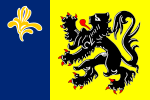Flag of the Brussels-Capital Region
 | |
| Use | Civil and state flag |
|---|---|
| Proportion | 2:3 |
| Adopted | 2015 |
| Design | A stylised iris upon a blue field |
 Different versions of the flag | |
The flag of the Brussels-Capital Region of Belgium consists of a stylized yellow, grey and white iris on a blue background. This is the flag of the whole Brussels Region, and the City of Brussels municipality has a different flag.
The first flag was adopted by the Capital Region in 1991.[1] A new flag based on the city's current logo became official in early 2015.
Symbolism of the iris
_(26498193435).jpg/440px-Yellow_Iris_(Iris_pseudacorus)_(26498193435).jpg)
The yellow iris, an Iris pseudacorus, as a symbol for Brussels dates back to before 1924 with Cornette writing that the flower was chosen to represent the city as it could be found growing in the marshes – the city itself was founded on marshy ground on Saint-Géry Island – today even through the expansion and industrialisation of the city.
The plant used to surround the city walls and, according to legend, gave a key victory to the Dukes of Brabant: knowing the plant could only grow in shallow water, the Duke's troops could gallop through the flooded plains by keeping to the iris covered areas. His opponents however, seeing them crossing but not knowing of the iris, attempted to cross but got bogged down in the marshes.
The flower also featured on the sceptre of the descendants of Charlemagne. This included Charles of France, who set up a fortified camp in the area, in the Duchy of Lower Lotharingia, and chose the site as the capital. This is considered the foundation of Brussels.
First flag (1991–2015)

The Brussels-Capital Region, created on 18 June 1989, adopted the plant as the symbol of the city on 5 March 1991.[1] The exact design was chosen through a public competition, with the design by Jacques Richez being chosen. The blue and yellow colours are those of the European Union, of which Brussels is the de facto capital city.[2]
Design
The flag, as defined by law, had proportions of 2:3. The iris is yellow with a white border and the background is blue.
| Blue | Yellow | |
|---|---|---|
| Pantone | Blue 280 | Yellow 116 |
| Gold 874 |
Current flag (2015–present)
The current flag was proposed in 2014 to match the region's new logo.[3] The stated reason was an evolution of the city's public image, and to maintain a unity in the symbols used by the city.[4] The decision to change the flag, already a clear symbol of Brussels after only 25 years, received criticism. Opposition members complained that it is disrespectful and inappropriate to change a flag to suit the latest fashion in graphic design.[2] On 9 January 2015 the bill was approved by the Parliament of the Brussels-Capital Region,[5] and the flag became official shortly after.
The law provides for six different colour schemes of the emblem, including two in black and white.[3] The flag is expressly not defined in terms of heraldic terminology (a blazon). Instead, the originals of the designs of the flags and the norms for reproduction are kept by the Clerk (Greffe/Griffie) of the Parliament of the Brussels-Capital Region.[3]For the primary colour scheme, the law provides colour values for blue, yellow, and grey in 5 forms, each of which is slightly different from the other. In practice the RGB values are usually used.
| Blue | Yellow | Grey | ||||
|---|---|---|---|---|---|---|
| Pantone | Blue 072 | 102 | 421 | |||
| CMYK | (100%, 85%, 0%, 5%) | (0%, 5%, 93%, 0%) | (16%, 13%, 13%, 20%) | |||
| RGB (decimal) | (10, 0, 190) | (255, 242, 3) | (184, 184, 186) | |||
| RGB (hexadecimal) | #0900BD | #FFF202 | #B9B9BC | |||
| RAL | 5022 | 1018 | 7004 | |||
Derivative flags
The original flag's colours and emblem are used on the flag of the French Community Commission and the Flemish Community Commission, both of which are based in the Brussels-Capital Region.
See also
References
- ^ a b Ordonnance du 16 mai 1991 portant fixation de l'emblème et du drapeau de la Région de Bruxelles-Capitale
- ^ a b "Gewest gaat voor nieuwe vlag met hartjeslogo". brusselsnieuws.be (in Dutch). Brussels. 17 December 2014. Retrieved 1 January 2015.
- ^ a b c The bill on the new flag's adoption (French/Dutch)
- ^ "Nieuwe vlag voor Brussels Gewest: geraamde kosten 50.000 euro". De Morgen. 17 December 2014. Retrieved 1 January 2015.
- ^ Progress of the bill on the new flag
External links
- Region of Brussels-Capital (Belgium), Flags of the World
- L'iris, fleur symbole de la Région de Bruxelles-Capitale Archived 2016-03-03 at the Wayback Machine, EuroBru

